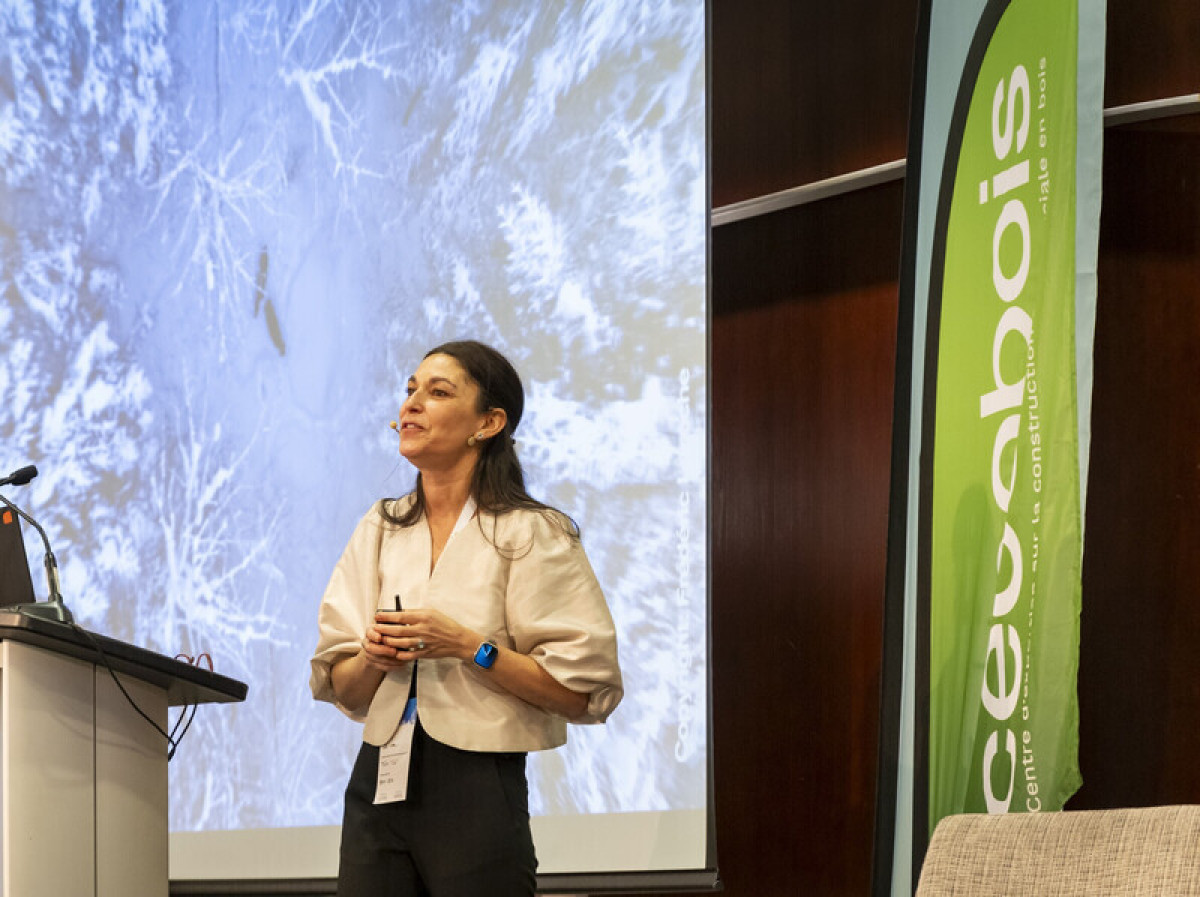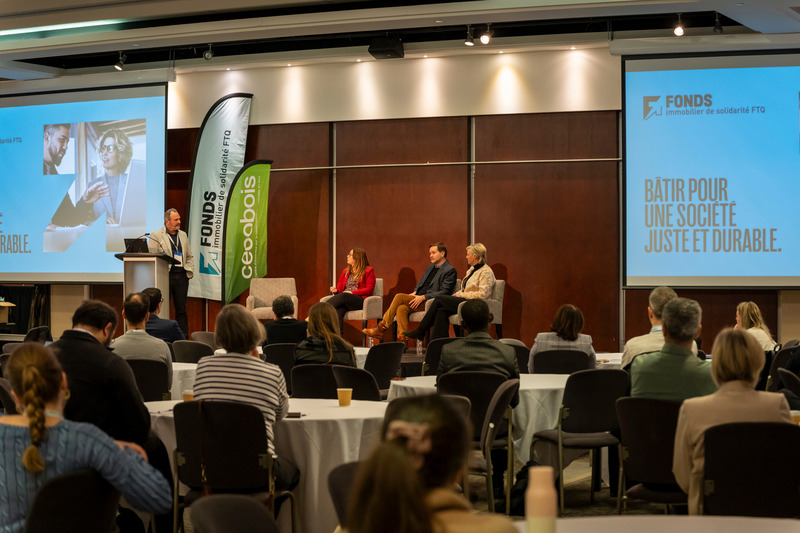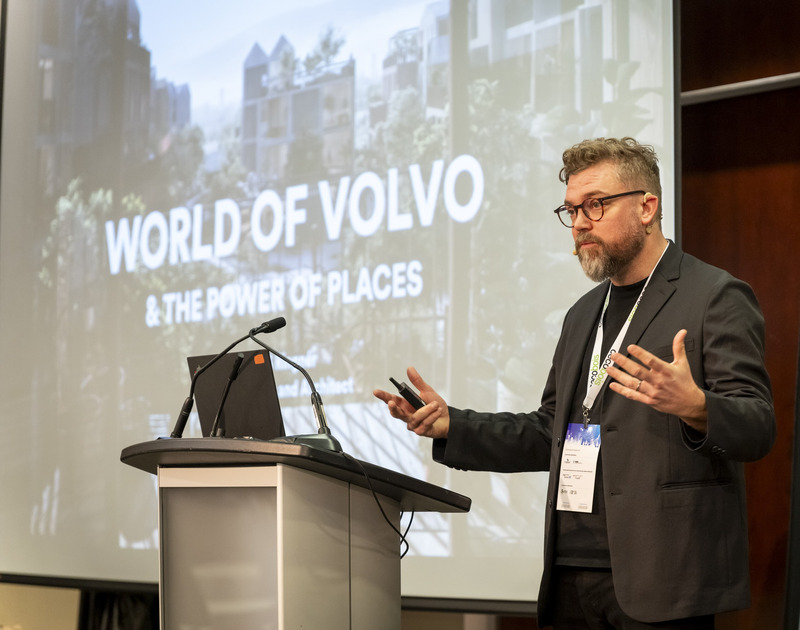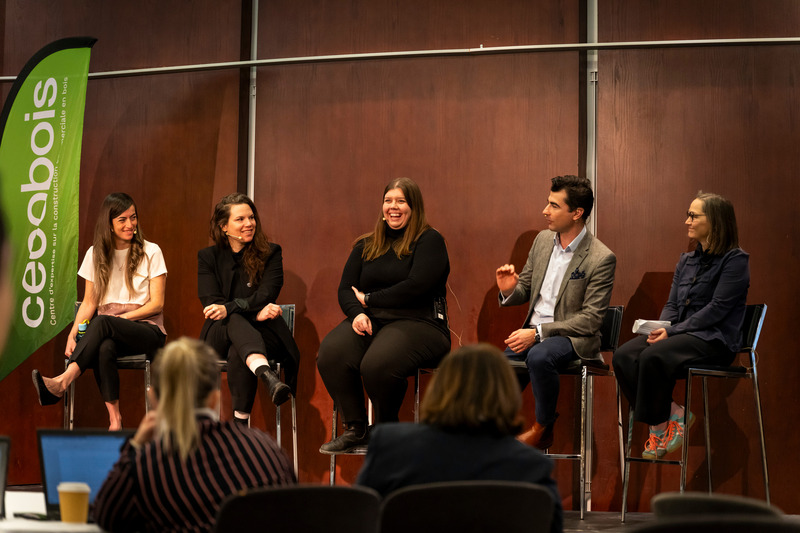19 Feb 2025

The 2nd edition of the Forum sur la construction bas carbone et biosourcée (CBCB) [forum on low-carbon and bio-based construction], organized by the Centre d’expertise sur la construction commerciale en bois (Cecobois), has come to a close after two days rich in exchanges and lectures devoted to reducing embodied carbon in buildings. With its diversified program, the Cecobois team gives a positive review of this edition, which brought together over 250 participants, 54 speakers, and 16 exhibitors to hear about the environmental performance of buildings.
A message from the Minister of Natural Resources and Forestry, Maïté Blanchette Vézina, marked the opening of the CBCB Forum, reaffirming the Quebec government’s commitment to sustainable construction as part of the Policy for the Integration of Wood in Construction, essential innovation and training levers for increasing the use of wood and reducing emissions from the building sector were identified. International guests addressed the professionals at the opening conference on French public policies for decarbonizing the construction sector, including the RE 2020 environmental regulation, which sets thresholds for GHG emissions. Marjolaine Meynier Millefert, President of HQE-GBC, and Lionel Causse, MP for the Ensemble pour la République group and former President of the Conseil National de l’Habitat, two stakeholders who played a key role in setting up the French legislative framework for low-carbon construction and renovation, presented the French approach.

Four key lectures: Taking Timber Construction to the Next Level
L’Arboretum de Nanterre, presented by architect Paul Laigle from Leclercq, and Laurent Petit of WO2, Europe’s largest timber campus, showcased the successful collaboration of French timber companies—developers, architects, engineers, and acousticians—in the construction of this 125,000m2 solid-wood office campus.
Another keynote lecture focused on the Scandinavian policy perspective and the Swedish climate declaration, with strategies to reduce emissions and contribute to the international goal of net zero emissions by 2050 presented by Marie-France Stendal, architect at STGM. Sustainable design was also discussed through the climate declaration presented by Thiago Ferreira, Ramboll, the concept of the right to nature known as “Allemansrätten”, and The World of Volvo project presented by architect Martin Stenberg Ringnér de Henning Larsen, as well as a parallel with Quebec projects, carried out by STGM, where sustainability has been positioned at the heart of the environmental value of their projects, enabling long-term appreciation of sustainable design choices, illustrated by Stephan Langevin.

A lecture targeting developers introduced French firm WO2, involved in the solid wood construction of large-scale housing developments in France. Marc Lafont, Executive Director of WO2, brought a message of structure to the construction sector, emphasizing expertise and low-footprint construction techniques.
Lastly, the lecture on the unique experience of Quebec’s six Lab-Écoles was of great interest to many participants. Geneviève Riopel of DMA Architecte, from the Gatineau lab-école, Kim Pariseau of Appareil Architecture, from the Saguenay lab-école, Laurence St-Jean of ABCP Architecture, from lab-école de Donnacona, Thomas Gauvin-Brodeur from Leclerc Architectes, from lab-école de Maskinongé, and Katarina Cernacek of Lapointe Magne et associé, from the Rimouski lab-école, presented their projects, focusing on reducing the environmental impact of school construction.

Cecobois would also like to thank its two collaborating partners who helped enhance the program with highly relevant lectures:
In addition to the lectures, some participants were able to visit the Esplanade Tranquille in the Quartier des Spectacles, one of the buildings to receive the Cecobois Prix d’excellence in 2023, in the company of FABG Architectes.
Mission accomplished for the launch of the Low Carbon Construction with Wood initiative.
Cecobois also took the opportunity to launch its Low-Carbon Construction with Wood initiative, in the presence of Jean-François Béland, Associate Deputy Minister for Forests at the MRNF, Jean-François Samray, President and CEO of QFIC, and Louis Poliquin, Cecobois Director. In its plan to implement the Plan for a Green Economy 2030 (PEV), the Quebec government aims to transform construction and renovation practices by promoting the use of energy-efficient, low-carbon building materials.
We’d also like to thank our major partners, Guimond Construction and Fonds immobilier de solidarité FTQ, for making this event possible and enabling us to offer a top-notch program. We would also like to thank all the speakers for their generosity in sharing their knowledge.
Next CBCB Forum in 2026
Building on the success of its second edition, the Forum sur la construction bas carbone et biosourcée will be back with a rich program on February 18 and 19, 2026, at the Bonaventure Hotel in Montreal. The aim will be to continue to mobilize industry players and encourage a collective dynamic to accelerate the transition to more sustainable construction in Quebec.